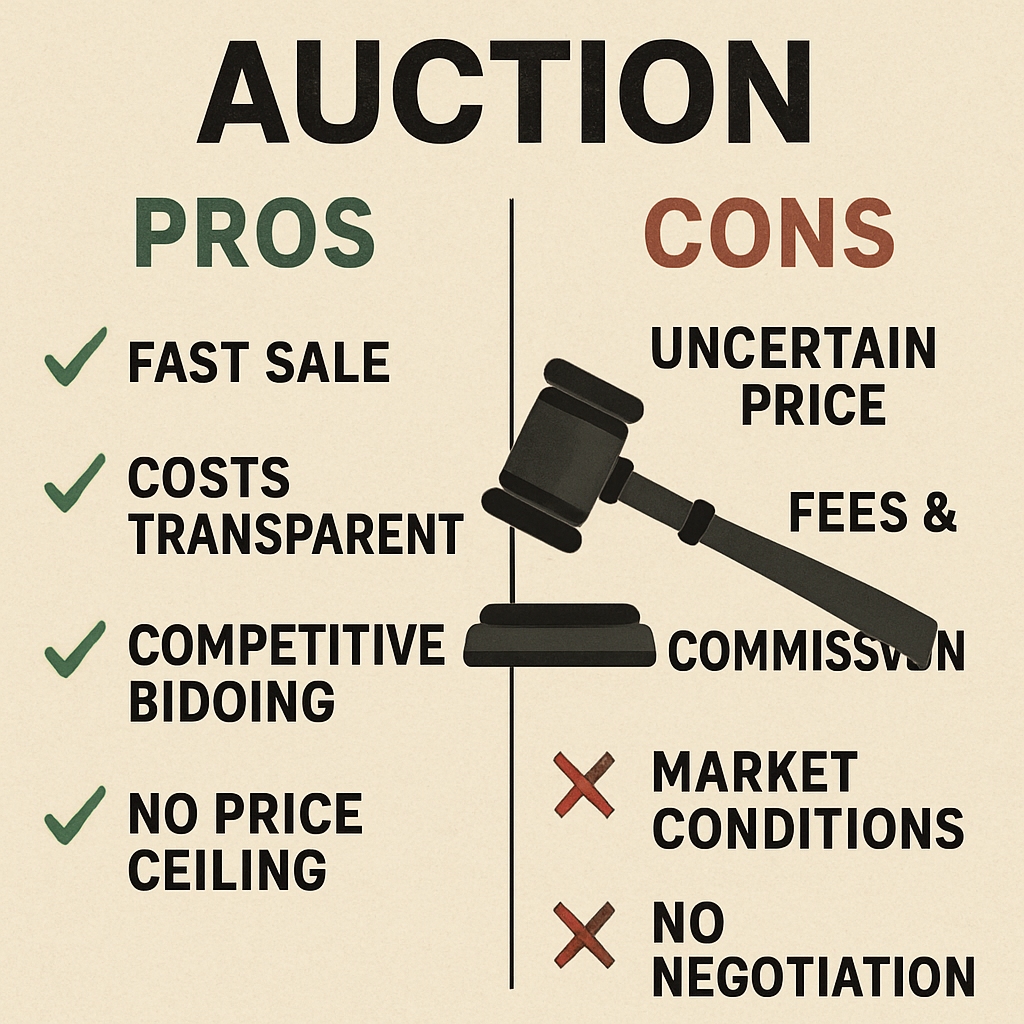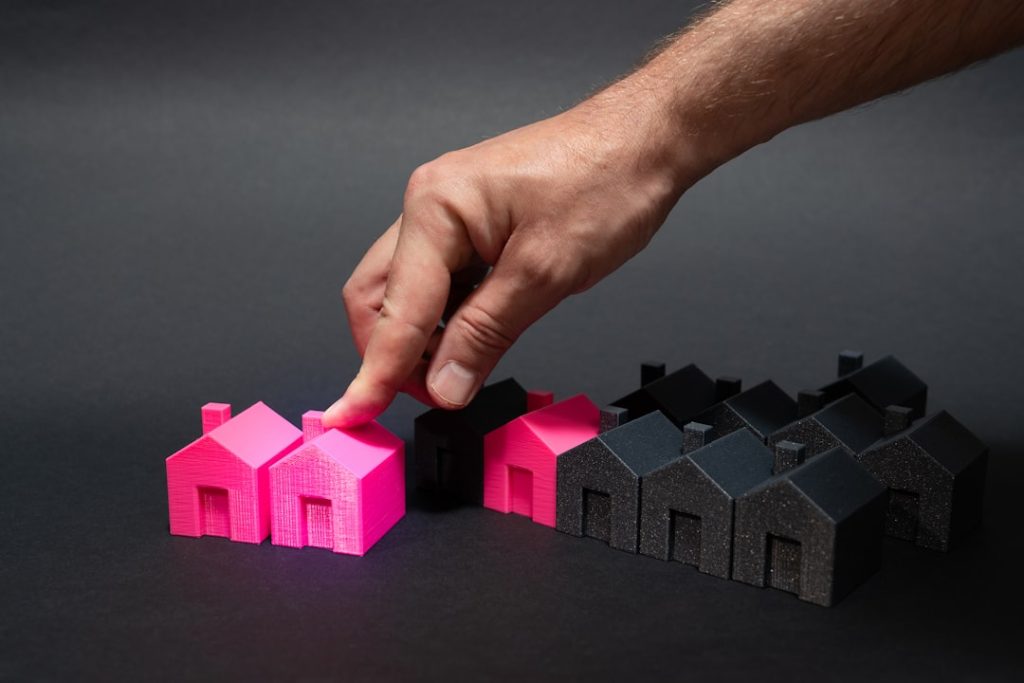
When it comes to buying a property, real estate auctions can offer some enticing deals. However, navigating the process of securing a mortgage for an auction property can be a bit daunting.
If you’re wondering, “Can you get a mortgage on an auction property?” you’re not alone. In this article, we’ll explore the ins and outs of financing auction properties, shedding light on the steps you need to take to successfully secure a mortgage.
Table of Contents

Real estate auctions are public sales where properties are sold to the highest bidder. These auctions typically occur because the property is in foreclosure or the owner is looking to sell quickly. Properties sold at auction can often be purchased below market value, making them attractive to investors and homebuyers alike.
Types of Real Estate Auctions
- Absolute Auction: In this type of auction, the property is sold to the highest bidder regardless of the price. There’s no minimum bid, so it’s possible to snag a great deal.
- Reserve Auction: Here, the seller has set a minimum reserve price. If bidding doesn’t reach this price, the property won’t be sold.
- Foreclosure Auction: These auctions occur when a homeowner defaults on their mortgage, and the lender seeks to recoup the loan balance by selling the property.
Pros and Cons of Buying at Auction

Pros:
- Potential for Bargains: You might buy a property at a significantly lower price.
- Quick Process: Auctions can conclude much faster than traditional sales.
Cons:
- Limited Inspection: You often can’t thoroughly inspect the property beforehand.
- Financial Risk: You might need to pay in cash or secure financing quickly.
Securing a Mortgage for an Auction Property
Is It Possible?
Yes, you can get a mortgage on an auction property, but it requires preparation and speed. Traditional mortgage lenders are typically hesitant to finance auction properties due to the fast-paced nature of auctions and the potential for unknown property conditions. However, some lenders specialize in providing loans for auction properties.
Steps to Secure a Mortgage
- Get Pre-Approved: Before attending an auction, obtain a pre-approval letter from a lender. This document indicates that you qualify for a loan up to a certain amount, giving you a clearer picture of your budget.
- Research Lenders: Look for lenders experienced in financing auction properties. They understand the unique challenges and can offer products tailored to auction purchases.
- Understand the Property’s Condition: Although thorough inspections might not be possible, try to gather as much information as you can about the property’s condition. This will help you decide if you’re willing to risk financing it.
- Prepare for a Quick Closing: Auction sales require fast closings, often within 30 days. Ensure your lender can meet this timeline.
Alternative Financing Options

If a traditional mortgage isn’t feasible, consider these alternatives:
- Hard Money Loans: These are short-term loans secured by the property itself. They usually have higher interest rates but can be arranged quickly.
- Home Equity Loans: If you already own a home, you might use its equity to finance the auction property.
- Cash Purchase: If possible, paying cash simplifies the process, though it requires having the necessary funds available.
Read About: How To Start Your Real Estate Apprenticeship Journey
Step-by-Step: How to Get a Mortgage for Auction Property
- Start with a Mortgage Agreement in Principle (AIP)
Get pre-approved by a lender so you know how much you can borrow. This also shows auctioneers you’re a serious buyer.
- Check the Auction Catalogue and Legal Pack
Auction houses release their property lists and legal packs in advance. Always:
- Read the legal pack thoroughly
- Have a solicitor review it for red flags
- View the property in person
- Get a Property Survey
Arrange a RICS Homebuyer Report or Building Survey if possible. This can help avoid nasty surprises (like structural issues) that could derail mortgage approval.
- Choose the Right Mortgage Product
You’ll likely need:
- A specialist auction mortgage with fast completion times
- Or a bridging loan if the property is unmortgage able or time is too tight
- Bid and Complete
If you win the auction:
- Pay the 10% deposit immediately
- Finalise your mortgage
- Complete the purchase within 28 days
💼 Types of Mortgages for Auction Properties
Finance Type | When to Use | Pros | Cons |
Standard Residential | Livable homes for personal use | Lower interest rates | May not meet 28-day deadline |
Buy-to-Let Mortgage | Rental properties | Designed for investors | Slower to process |
Auction Mortgage | Properties bought at auction | Faster processing, tailored to deadlines | Limited to certain lenders |
Bridging Loan | Unmortgage able or time-sensitive deals | Very fast, flexible | High interest, short-term only |
Development Finance | Major renovations or conversions | Funds released in stages | Complex setup, requires exit strategy |
⚠️ Common Pitfalls to Avoid
- ❌ Bidding without a mortgage or AIP
- ❌ Not reading the legal pack carefully
- ❌ Ignoring renovation costs
- ❌ Assuming all properties are mortgageable
You could lose your 10% deposit and face legal consequences if you can’t complete the sale in time.
🧠 FAQ: Auction Mortgages in the UK
Can I use a mortgage to buy an auction property?
Yes, if the property is mortgageable and you act quickly. Bridging finance is also an option if a mortgage won’t complete in time.
What happens if I can’t complete within 28 days?
You’ll likely lose your deposit and may be liable for additional costs. That’s why pre-auction finance is crucial.
What’s the minimum deposit needed?
You’ll need to pay 10% of the purchase price on the day of the auction.
Can first-time buyers get auction mortgages?
Yes, but it’s trickier. You’ll need strong finances and to work with a broker who understands the auction process.
Who offers auction mortgages?
Specialist lenders include:
Precise Mortgages
Together Money
MT Finance
Shawbrook Bank
Important Considerations
Auction Rules and Regulations
Before participating in an auction, familiarize yourself with its rules. Each auction house may have different requirements for bidding and payment.
Due Diligence
Conduct due diligence by researching the property’s title, liens, and taxes. Failing to do so can lead to unexpected financial burdens post-purchase.
Budget Wisely
Include potential repair costs in your budget. Auction properties might require significant renovations, affecting your overall investment.
Conclusion
Buying a property at auction can be a rewarding venture, but it requires careful planning and understanding of the financing process.
While securing a mortgage on an auction property is possible, it demands preparation, flexibility, and sometimes creative financing solutions.
By researching and aligning with the right lenders and understanding the auction process, you can increase your chances of successfully acquiring a property through auction, potentially at a bargain price.
Whether you’re an investor seeking your next project or a homebuyer looking for a unique opportunity, the auction route can offer exciting possibilities.
In conclusion, while the path to securing a mortgage on an auction property might be complex, it’s certainly navigable with the right approach and resources. Happy bidding!



